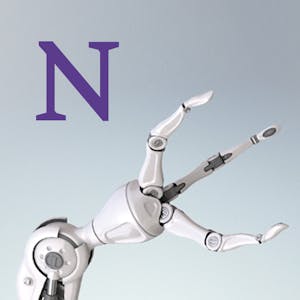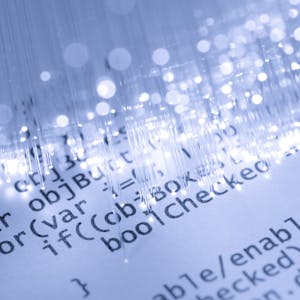Modern Robotics, Course 2: Robot Kinematics
About this Course
Do you want to know how robots work? Are you interested in robotics as a career? Are you willing to invest the effort to learn fundamental mathematical modeling techniques that are used in all subfields of robotics? If so, then the \"Modern Robotics: Mechanics, Planning, and Control\" specialization may be for you. This specialization, consisting of six short courses, is serious preparation for serious students who hope to work in the field of robotics or to undertake advanced study. It is not a sampler. In Course 2 of the specialization, Robot Kinematics, you will learn to solve the forward kinematics (calculating the configuration of the \"hand\" of the robot based on the joint values) using the product-of-exponentials formula. Your efforts in Course 1 pay off handsomely, as forward kinematics is a breeze with the tools you\'ve learned. This is followed by velocity kinematics and statics relating joint velocities and forces/torques to end-effector twists and wrenches, inverse kinematics (calculating joint values that achieve a desired \"hand\" configuration), and kinematics of robots with closed chains. This course follows the textbook \"Modern Robotics: Mechanics, Planning, and Control\" (Lynch and Park, Cambridge University Press 2017). You can purchase the book or use the free preprint pdf. You will build on a library of robotics software in the language of your choice (among Python, Mathematica, and MATLAB) and use the free cross-platform robot simulator V-REP, which allows you to work with state-of-the-art robots in the comfort of your own home and with zero financial investment.Created by: Northwestern University

Related Online Courses
In this guided project, you will learn how to build automated image quality inspection using Amazon Lookout for Vision. Amazon Lookout for Vision is a Machine Learning as a Service from Amazon Web... more
Finding meaningful work and happiness in the AI age depends on you - your ability to learn, unlearn, and re-learn at the pace of technological change. Follow Edward D. Hess, Professor Emeritus of... more
This course will provide a solid foundation for understanding how APIs are utilized in network automation by discussing important topics such as data encoding formats, REST APIs, and the Python... more
This Specialization is intended for the learner with no previous programming experience or the career changer transitioning to software development. JavaScript is generally the first programming... more
Welcome to Agroforestry II: Major Systems of the World A focused exploration of agroforestry practices from around the world. This is the second module of the five-module course covering the... more








